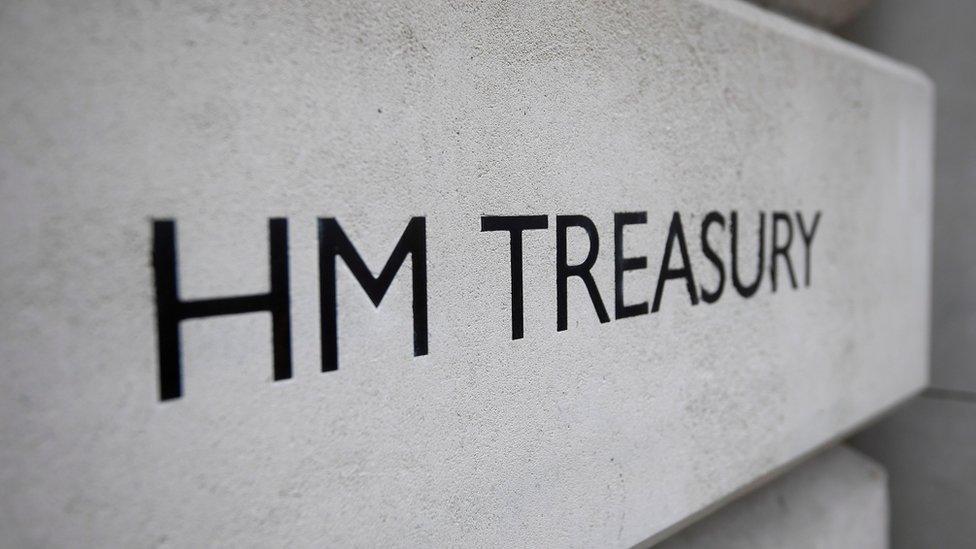Where are government heads at over cost of living?
- Published

While Westminster waits for the Sue Gray report, I am very conscious that some of you reading my stuff on here have had enough of all the Partygate stories and would much rather us focus on other things.
Hopefully you understand why scrutinising the government and holding those in it to account for their actions is so important.
But I also get that for millions of families right now, the absolute focus is on skyrocketing prices and the cost of living.
The bleak headlines seem to never stop, with the latest coming from energy regulator Ofgem, reckoning that bills are going to go up by another £800 per year for the typical UK household.
So I thought I'd bring you a quick update on what I am hearing from within government and beyond it about their ongoing thoughts about what they may or may not do about it.
In the last few days, the prime minister invited a bunch of economists in to see him, with a range of views.
They kicked around the range of options open to him - and their costs, advantages and drawbacks.
Boris Johnson and the Chancellor Rishi Sunak will meet soon to sign off what they plan to do.
An announcement could come as soon as Thursday.
Politically rather useful, for a government that wants to talk about something, anything else but Partygate.
But beyond any short-term politicking, it's not lost on senior figures how colossal the economic challenge ahead looks.
What help at what cost?
Mr Sunak has long argued - privately and publicly - that help for the most vulnerable could only be properly designed once the scale of the problem was measurable.
Tuesday's intervention from Ofgem, broadly in line with Treasury projections of what might happen, provides that.
The question now is precisely what help is offered and at what cost.
Targeted possibilities include up-rating benefits or a lump sum payment to some of the poorest households.
There is then the quandary of whether to offer something that a greater proportion of people benefit from - could the first £40 repayment of the government's Energy Bills Support Scheme be postponed or cancelled?
Other options in the months ahead include changes to the Warm Homes Discount and the Winter Fuel Payment.
Then there is the question of how this is all paid for.
One economist suggested to me any combination of these possibilities could easily cost £10bn.
So what about this windfall tax on gas and oil companies which keeps getting talked about?
Windfall taxes are "not the simple easy answer" to every problem, the chancellor tells MPs.
What we have been seeing play out in public is philosophy and ideology smashing into reality.
In other words, Conservatives don't instinctively like windfall taxes, seen by many Tories as a kneejerk appropriation of the profits of a sector that just happens to have done well.
But, the energy companies have had a genuine windfall and senior figures in government are pretty grumpy that in various meetings with their executives they don't seem to get it.
Their promises of investment, so senior government sources say, aren't robust enough - too many refer back to promises made before their recent boom in profits.
"They've raked in enormous profits and not really helped themselves," is how one figure put it to me.
No panacea
So, a u-turn has looked increasingly likely for a bit, but there's been hesitation in grabbing the handbrake.
And that's because there is not only discussion about whether to do it - there is also discussion about how to do it, when to do it and what to do with the money raised.
Is it possible to design a tax that encourages investment and generates revenue?
Possibly, but some economists warn designing that could be very tricky.
Those kicking the idea around are also very conscious it is not a panacea: "If we did it, everyone would be back the following week asking 'now what?'"
It wouldn't bring in anywhere near the kind of money needed for a mix of the options floated above.

The debate over what action to take rages on in the Treasury
This at a time where the pandemic has left the government facing a bill of around £80bn a year in paying the interest on the UK's national debt.
When government spending and taxing is higher than at any time in recent decades.
And where rises in interest rates in the last few months mean that debt interest payments have gone up by about £8bn.
To put that in context, it costs around £6bn a year to take a penny off income tax.
Big numbers, big decisions. And an intervention that is noticeable won't come cheap.